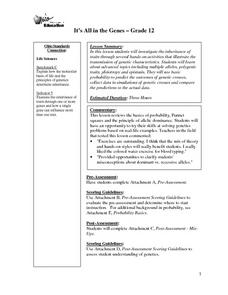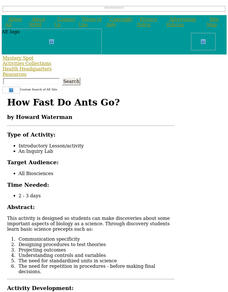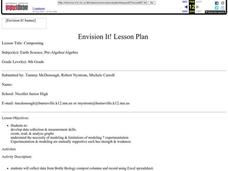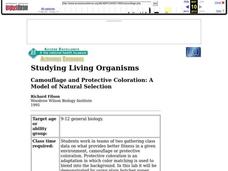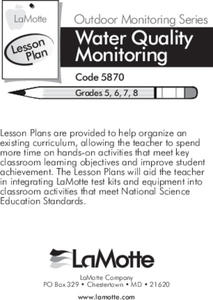Curated OER
Careers in Science
Students learn the trends in the current job market for scientists,
find where the jobs are, the range of salaries, and the job requirements.
They discover that scientists do some very interesting things, then
write a letter of...
Curated OER
Nature of Science and Ecology
Students identify the different biotic and abiotic components of an ecosystem. In this ecology instructional activity, students perform a case study on current environmental problems. They write a position statement about their chosen...
Curated OER
Root, Root, Root for the Nutrients
Students observe the growth of a seed, predict what will happen when seeds are planted without soil, and conduct an experiment using a hydroponics system.
Curated OER
Campus Greenhouse Gas Emissions Inventory
Students brainstorm the campus links to global warming. Students pick topics for individual or group research. Students develop a research plan. Students keep good records and report their progress. Students report findings both...
Curated OER
Understanding Interactions Among Local Species and the Local Environment
Students examine the differences between biotic and abiotic factors, explain the difference between habitat and niche and compare how organisms get their nutritional needs. In this local environment activity students trace the path of...
Curated OER
It's All in the Genes
Twelfth graders investigate the inheritance of traits through several hands-on activities that illustrate the transmission of genetic characteristics. Students study advanced topics including multiple alleles, polygenic traits,...
Curated OER
Major Functions
Seventh graders investigate the basic characteristics and needs of living things. They identify the major parts of plants and animals by making lists. Students focus upon one living thing and speculate how if one part is changed how it...
Curated OER
Down, Dung and Dirty
Students investigate the stages of succession in animal dung communities. They create a dung culture using fresh cow, goat or horse dung then record data on the fungal species that appear over a two week period.
Curated OER
How Fast Do Ants Go?
Students make discoveries about some important aspects of biology as a science. They study basic science precepts such as communication specificity, designing procedures to test theories by designing an experiment that tests the speed of...
Curated OER
Composting
Eighth graders collect data from Bottle Biology compost columns and record using Excel spreadsheet.
Curated OER
World-wide Search for the Dominant Trait
Students receive instruction on dominant/recessive traits, access World-Wide Search for the Dominant Trait and download information on which traits to assess. They collect data on at least 20 people and prepare a data chart.
Curated OER
Stream Flow in Blacks Creek
Students explore what factors affect the stream flow in a local body of water. They collect data to measure stream flow and discharge and construct a hypothesis concerning the factors affecting stream flow.
Curated OER
Science: Trouble in the Troposphere
Students research a NASA Website and record information about an assigned city's tropospheric ozone residual monthly climate. In groups, they graph the information for the past year. They form new groups and compare their city's...
Curated OER
Camouflage and Protective Coloration: A Model of Natural Selection
Students collect data and compare whether protective coloration or camouflage provides better biological fitness in a given environment. They simulate predator prey interactions of two different species and use gene frequencies to...
Curated OER
Hazard Mitigation: Bioterrorism
Students discuss different ways to spread infectious diseases. In this bioterrorism lesson, students model the rate of smoke emission using CalRoad software. They analyze the effects of airborne release of biological...
Curated OER
Water Quality Monitoring of Natural Water
Students create their own monitoring program for natural water. They collect samples from an appropriate sampling site. They perform chemical and biological analyses of their samples. They present their information to the class.
Curated OER
Comparative Stream Quality
Learners examine water quality on a nearby stream. They collect water samples and test for various factors, including any contamination from the treatment plant, and present their information in a Powerpoint presentation.
Curated OER
Age Structure Studies
Students collect data from Internet sources to compare age distributions in their city, county or state with that of other places in the US or other countries. They construct and interpret age-structure population pyramids and research...
Curated OER
Leaving Home
Learners explain the importance of larval dispersal and retention to populations. They collect data on organisms and examine it.
Curated OER
Testing Soils for Garden Planting
Sixth graders collect soil samples and record the location of the samples by using GPS.
Curated OER
North Dakota Plants with Lewis and Clark
Tenth graders identify native plants of North Dakota. They compare the plants found on native prairie with the plants described in the Lewis and Clark journals. They present the information they have collected in an electronic format...
Curated OER
Goobers. Goobers? Goobers!
Students begin the activity by noting the many ways in which to use peanuts. In groups, they use the internet to research the work of George Washington Carver. They discover the allergies and nutritional information of the peanut and...
Curated OER
Multiplying Microbes
Ninth graders investigate the techniques of culturing bacteria. They culture bacteria using agar plates. Students identify and describe some environmental conditions that effect bacteria growth.
Curated OER
Drugged Out Daphnia
Ninth graders participate in experiments to investigate the the effects of nicotine, caffeine, aspirin, alcohol, and sleeping pills on the heart rates of Daphina. They describe the relationships between common drugs and heart rates....







